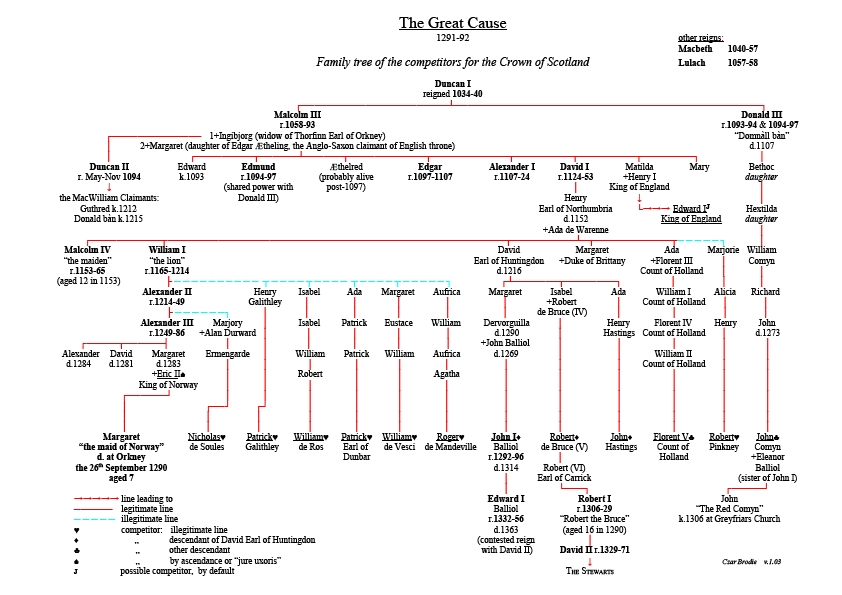How would late 13th century Scottish history develop if Alexander III. didn't die due to a riding accident in 1286 ?
His death led to a major succession crisis in Scottish history, to a period of regency for his grand-daughter and potential heiress Margaret of Norway, and eventually culminated in a 10 year long period of tension and in English-Scottish wars that lasted since 1296 for nearly 20 years, until coming to an end at the Battle of Banockburn in 1314.
Without Alexander's death, Edward I. would not pursue a renewed interest in claims to the Scottish throne. He wisely did so in a "proxy" way, through support of allies among the other claimants - most notably John Balliol, who did indeed eventually gain the throne in 1292, after a six years long interregnum. (Margaret of Norway died in 1290, leaving a more direct succession impossible.) Balliol's vassals and noblemen gradually grew discontent with what they saw as him being a puppet to Edward I., so they rebelled against John in the mid 1290s and he himself abdicated in July 1296, after a series of defeats by Edward I. (most notably the taking of Dunbar Castle). In 1296 and the following year, Andrew Murray (a.k.a. de Moray) and William Wallace united parts of the Scottish nobility and started a counter-offensive against the English invasion, kicking off the aforementioned period of wars.
So, let's say Alexander III. lives for five years more, or ten years more, or even longer. Though he was old and had lost all three of his children already before his death in OTL, was there any hope for him for gaining a male or female heir ? Maybe even a slightly more distantly related scion, even in case his grand-daughter died in the ATL as well ? Would Edward I. and his own heirs keep claims to the Scottish throne on the backburner if the OTL crisis never happened (or occured some years or decades later) ?
His death led to a major succession crisis in Scottish history, to a period of regency for his grand-daughter and potential heiress Margaret of Norway, and eventually culminated in a 10 year long period of tension and in English-Scottish wars that lasted since 1296 for nearly 20 years, until coming to an end at the Battle of Banockburn in 1314.
Without Alexander's death, Edward I. would not pursue a renewed interest in claims to the Scottish throne. He wisely did so in a "proxy" way, through support of allies among the other claimants - most notably John Balliol, who did indeed eventually gain the throne in 1292, after a six years long interregnum. (Margaret of Norway died in 1290, leaving a more direct succession impossible.) Balliol's vassals and noblemen gradually grew discontent with what they saw as him being a puppet to Edward I., so they rebelled against John in the mid 1290s and he himself abdicated in July 1296, after a series of defeats by Edward I. (most notably the taking of Dunbar Castle). In 1296 and the following year, Andrew Murray (a.k.a. de Moray) and William Wallace united parts of the Scottish nobility and started a counter-offensive against the English invasion, kicking off the aforementioned period of wars.
So, let's say Alexander III. lives for five years more, or ten years more, or even longer. Though he was old and had lost all three of his children already before his death in OTL, was there any hope for him for gaining a male or female heir ? Maybe even a slightly more distantly related scion, even in case his grand-daughter died in the ATL as well ? Would Edward I. and his own heirs keep claims to the Scottish throne on the backburner if the OTL crisis never happened (or occured some years or decades later) ?
Last edited:
